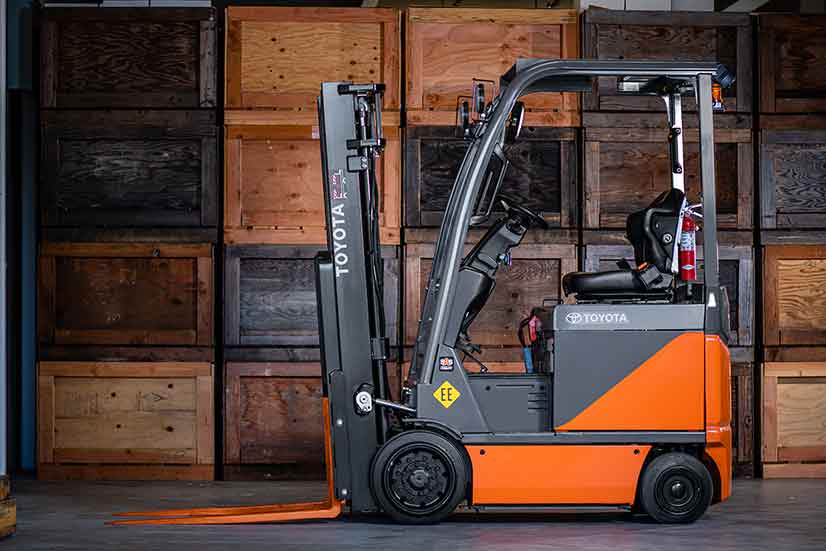Electric forklifts offer a sustainable and cost-effective solution for material handling. Understanding their advantages and capabilities is essential for making informed decisions about incorporating them into your business operations. In this blog post, we’ll answer 15 frequently asked questions about electric forklifts to help you better understand their benefits, operation, and more.
1. What are the advantages of electric forklifts over gas or diesel forklifts?
Electric forklifts offer numerous benefits, including lower operating costs, reduced emissions, less maintenance, operator comfort, and a quieter operation.
Switching to electric forklifts also helps California companies get ahead of the California Air Resources Board (CARB) Zero-Emission Mandate. CARB’s new mandate requires all new forklifts leased and sold in California after 2026 to be zero-emission vehicles. Learn more about the upcoming regulations here.
2. Are electric forklifts suitable for outdoor use?
Electric forklifts can operate outdoors but are typically better suited for indoor applications. However, some models work outdoors with features like all-terrain tires and weatherproofing.
Indoor and outdoor electric forklift models include Toyota’s 48V Electric Pneumatic, Toyota’s 80V Electric Pneumatic, Heli’s G Series AC Electric Pneumatic, and Noblelift’s 3-Wheel Electric Forklift.
3. How long does it take to charge an electric forklift? 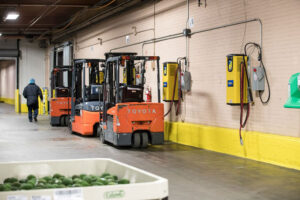
The charging time for electric forklifts depends on the battery capacity and charger type. Standard charging for a battery typically takes 8 to 10 hours, while fast chargers can reduce this to 2 to 4 hours. If you’re running multi-shift cycles, you can minimize downtime with opportunity-charging during lunch, breaks, and shift changes.
4. What is the lifespan of an electric forklift battery?
An electric forklift battery can last 5 to 7 years with proper maintenance. However, the lifespan can vary depending on usage, charging practices, and environmental conditions. Adopting simple forklift battery watering techniques gives you the best chance of preserving its lifecycle and enjoying maximum value from your purchase. Learn answers to frequently asked questions about watering a forklift battery here.
Do you need help with energy solutions or battery maintenance? TMHS recently partnered with Advanced Energy Solutions to give you access to the best energy experts in the industry. Contact AES to set up a free energy consultation today.
5. Can electric forklifts lift heavy loads?
Electric forklifts can lift heavy loads, and their lifting capacity varies depending on the model and configuration. Some electric forklifts are designed for light-duty applications, while others can handle heavy loads of up to 40,000 pounds or more.
6. Are electric forklifts as powerful as gas or diesel forklifts? 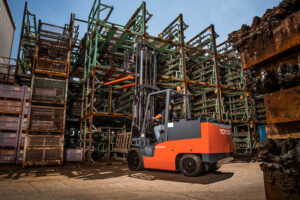
Electric forklifts can be as powerful as gas or diesel, and high-capacity electric forklifts, like Toyota’s High-Capacity Electric Cushion Forklifts are available for heavy-duty applications.
7. Are electric forklifts more expensive to purchase than gas or diesel forklifts?
Electric forklifts have a higher initial purchase price than their internal combustion engine counterparts since you essentially pay for fuel (the battery) upfront. However, they offer long-term cost savings due to lower operating and maintenance expenses.
8. Can electric forklifts operate in cold environments? 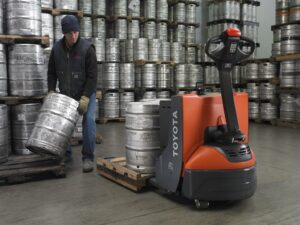
Yes, electric forklifts can operate in cold environments, but extreme cold can affect battery performance. Some electric forklifts are equipped with cold storage packages to address this issue.
9. What are the typical maintenance requirements for electric forklifts?
Regular maintenance for electric forklifts includes checking and maintaining the battery, inspecting tires, brakes, and other components, and ensuring proper charging practices. Maintenance schedules should follow manufacturer recommendations.
10. Are there government incentives for using electric forklifts?
In some regions, government incentives and rebates may be available to encourage the adoption of electric forklifts and other electric vehicles, and to offset the initial purchase cost. You can learn about California’s electric equipment incentives here.
11. Can electric forklifts be customized for specific applications?
Electric forklifts can be customized with various attachments and configurations to suit specific material handling needs. This versatility makes them adaptable to a wide range of industries and tasks.
12. What is regenerative braking in electric forklifts?
Regenerative braking is a feature in many electric forklifts that converts kinetic energy into electrical energy during braking, which returns to the battery. This feature improves energy efficiency and extends the battery’s lifespan.
13. Can electric forklifts be used in food handling or pharmaceutical environments? 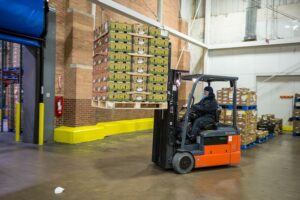
Yes, electric forklifts are suitable for food handling and pharmaceutical environments because they do not emit harmful fumes or exhaust, ensuring the safety and cleanliness of these sensitive areas.
14. Are there different types of electric forklift batteries?
Yes, there are two main types of electric forklift batteries: traditional lead-acid batteries and lithium-ion batteries. Each type has advantages and disadvantages, such as energy density and lifespan.
Do you have questions about forklift batteries? Our energy experts at Advanced Energy Solutions are here to help. Contact AES for a free energy consultation today.
15. Can electric forklifts be equipped with telematics for fleet management?
Most electric forklifts can pair with telematics systems that provide real-time vehicle location, usage, and performance data. This data can help improve fleet management and maintenance.
Electric forklifts have become indispensable tools in modern material handling. Their eco-friendly nature, versatility, and cost-efficiency make them attractive for businesses across various industries. Whether you’re looking to reduce emissions, cut operational costs, enhance the efficiency of your material handling operations or get ahead of CARB’s Zero-Emission Mandate, electric forklifts are a solution worth exploring.

